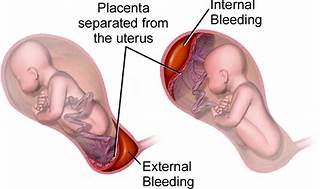A nurse is reinforcing teaching with a client who is pregnant and has a prescription for Rho(D) immune globulin. Which of the following information should the nurse include?
This medication destroys Rh antibodies in a newborn who is Rh-positive.
This medication destroys Rh antibodies in a woman who is Rh-negative.
This medication prevents the formation of Rh antibodies by a woman who is Rh-negative.
This medication prevents the formation of RH antibodies in a newborn who is Rh-positive.
The Correct Answer is C
Choice A rationale:
This statement is incorrect because Rho(D) immune globulin does not destroy Rh antibodies in a newborn who is Rh-positive. Instead, it acts to prevent the development of Rh antibodies in the mother.
Choice B rationale:
This statement is also incorrect. Rho(D) immune globulin does not destroy Rh antibodies in a woman who is Rh-negative. It is given to Rh-negative women to prevent them from forming Rh antibodies in response to Rh-positive fetal blood during pregnancy.
Choice C rationale:
This is the correct choice. Rho(D) immune globulin is given to Rh-negative women to prevent the formation of Rh antibodies. If an Rh-negative woman is exposed to Rh-positive blood (usually during childbirth), her immune system may recognize the Rh antigen as foreign and start producing Rh antibodies. These antibodies could potentially cross the placenta during a subsequent pregnancy and attack the red blood cells of an Rh-positive fetus, causing hemolytic disease in the newborn. Rho(D) immune globulin helps prevent this sensitization process.
Choice D rationale:
This statement is incorrect. Rho(D) immune globulin does not prevent the formation of Rh antibodies in a newborn who is Rh-positive. Its main purpose is to protect Rh-negative women from forming antibodies that could harm future Rh-positive pregnancies.
Nursing Test Bank
Naxlex Comprehensive Predictor Exams
Related Questions
Correct Answer is A
Explanation

The correct answer is choice A, Maternal hypertension.
Choice A rationale:
Maternal hypertension is widely recognized as the most common risk factor for placental abruption. High blood pressure can cause the placenta to detach from the uterine wall, leading to abruption. In summary, while all the listed factors can contribute to the risk of placental abruption, maternal hypertension stands out as the most common cause, supported by multiple health sources. It’s important for nurses to recognize and manage hypertension in pregnant clients to minimize the risk of this serious complication.
Choice B rationale:
While maternal cocaine use is a significant risk factor for placental abruption due to its vasoconstrictive effects, which can compromise the placental blood flow, it is not as common as maternal hypertension.
Choice C rationale:
Maternal cigarette smoking is also a risk factor for placental abruption. Smoking can lead to a variety of complications in pregnancy, including placental problems, but again, it is less common than hypertension as a cause for abruption.
Choice D rationale:
Maternal battering can lead to trauma which may result in placental abruption. However, it is not considered the most common risk factor when compared to maternal hypertension.
Correct Answer is A
Explanation
Choice A rationale:
Painless, bright red vaginal bleeding at 36 weeks gestation is indicative of placenta previa. Placenta previa is a condition in which the placenta partially or completely covers the cervix, leading to bleeding as the cervix begins to efface and dilate. The bright red color of the blood is due to its fresh origin from the exposed placental vessels. This condition is painless because the bleeding occurs without uterine contractions.
Choice B rationale:
Preterm labor is not the correct answer in this scenario. Preterm labor refers to the onset of regular uterine contractions leading to cervical changes before 37 weeks of gestation. In this case, the key indicator is painless bleeding, which is not associated with uterine contractions.
Choice C rationale:
Threatened abortion is also not the correct answer. Threatened abortion is the term used when a pregnant woman experiences vaginal bleeding, but the cervix is closed, indicating that there is still a chance for the pregnancy to continue. However, the bleeding in placenta previa is unrelated to fetal viability and is specifically caused by the placental position.
Choice D rationale:
Abruptio placentae is not the correct answer either. Abruptio placentae, also known as placental abruption, is a condition where the placenta prematurely separates from the uterine wall before delivery. This can cause painful bleeding due to the blood being trapped between the placenta and uterine wall. In the given scenario, the bleeding is described as painless, which does not align with the characteristics of abruptio placentae.
Whether you are a student looking to ace your exams or a practicing nurse seeking to enhance your expertise , our nursing education contents will empower you with the confidence and competence to make a difference in the lives of patients and become a respected leader in the healthcare field.
Visit Naxlex, invest in your future and unlock endless possibilities with our unparalleled nursing education contents today
Report Wrong Answer on the Current Question
Do you disagree with the answer? If yes, what is your expected answer? Explain.
Kindly be descriptive with the issue you are facing.
